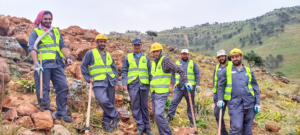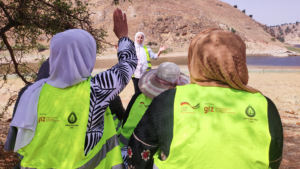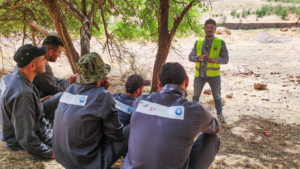For vulnerable Jordanians and Syrian refugees, the Protection of King Talal Dam through Labor-Intensive Activities (PROTEKT) project is a path towards a sustainable, meaningful profession in infrastructure and agriculture.
Blumont and Deutsche Gesellschaft für Internationale Zusammenarbeit (GIZ) GmbH are implementing the PROTEKT project on behalf of the German Federal Ministry for Economic Cooperation and Development (BMZ) to support water access and availability in Jordan and improve land conditions surrounding the dam, while also creating jobs for the local community.

PROTEKT will employ 500 people to support infrastructure and agriculture projects surrounding the King Talal Dam.
The project will provide temporary employment opportunities to 500 vulnerable Jordanians and Syrian refugees in areas surrounding the Zarqa River and King Talal Dam. We hire community members to support ongoing work, including the installation of irrigation networks, tree plantings, sediment removal, and construction of flood mitigation structures. We are conducting outreach to increase local communities’ knowledge of soil erosion and flood mitigation in agricultural lands to help protect the area surrounding the dam.
Sa’ada, a 29-year-old agriculture engineering graduate, has been in and out of jobs for the past seven years. Now employed through the PROTEKT project’s cash-for-work initiative, she is hoping that this job opportunity will help her launch her career. She supervises a group of 12 Jordanian and Syrian young women and is training them in sustainable agricultural methods.

In May, Sa’ada (middle, standing) supervised a group of 12 Jordanian and Syrian young women and is training them in sustainable agricultural methods.
“This is a great experience for me, I am learning from the other engineers, and gaining leadership and management skills,” Sa’ada said.
Twenty percent of the cash-for-work employees are women. Typically, women are excluded from manual labor jobs like the land improvement work under PROTEKT.
“The women who work with me are able to provide for their families. They are gaining new agricultural skills and building the confidence that they can participate in any agricultural project. This project is also helping change how society views women working in agriculture and making it more acceptable for women to do manual labor,” Sa’ada shared.
Qusai, a passionate farmer and a native of Jerash, is bringing his engineering education to the project as well.

Qusai (right, standing) brought his engineering expertise to the PROTEKT program and hopes the job will help launch his career.
He hopes this project can be a stepping stone for long-term employment. “I want to find a job with a steady income that I can depend on,” he said. “There aren’t many job opportunities in Jerash, so I was hopeful when I applied to work on this project.”
Qusai believes that protecting the King Talal Dam will positively affect his community and the environment. “This project is very important for the environment and the economic development for the area,” he said. “Maintaining the dam and the plants surrounding it can improve biodiversity and attract more tourists. As a tourist destination, the dam can bring multiple sources of income for the residents in those areas.”



